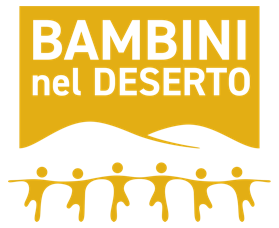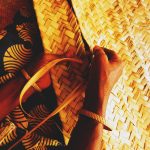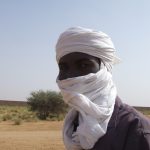The silent protagonist of this story is Mussa, a Tuareg, who, moved by a great love for his people, with courage and determination, decides to create better living conditions for his community. Children in the Desert meets him, listens to his dream and decides to support its realization.
In 2011 Mussa fled war-torn Libya. He had emigrated there as a child from Niger, due to the conflict experienced by his people. For the second time he escapes from a war and arrives in Italy, first in Lampedusa and then in Trento. In the summer of 2019, after several years of absence, he returns to Niger, to his homeland. With the eyes of the man he has become and with his story behind him, he reviews the very harsh existence of those who are forced to face long journeys every day to stock up on water and feel the responsibility of not being able to stand by and watch. Upon returning from that trip, in September 2019, solely with his economic resources and guided by courage and firmness, Mussa decides to start a project for his community: to create better living conditions in Accarara, a desert area in the municipality of Tokoukoute , about 70km from Agadez, the capital of the AIR region, digging a well, planting trees, starting crops and building shelters: a decidedly unequal fight against the desert, very difficult and full of obstacles. “Aman Iman”, “water is life”, says a proverb in the Tamaschek language, the Tuareg language. And so it had to be. Accarara is located in the middle of the Nigerian Sahara desert, an arid area for about 8 months of the year due to a constant reduction in the rainy period due above all to a marked climate change and a very strong wind that blows incessantly every day. Tuareg and Fula live in that area, people who face immense hardship every day to survive and long journeys to get water.
The rains don’t come every year. Many can pass without a good season of rainfall and for this reason many people abandon their land, taking refuge in places already inhabited by others in difficulty, often causing tensions that determine the need to move even further away. Some take refuge in the cities, like desert refugees, forced into precarious situations that sooner or later make it necessary to move again. The only activity practiced is a form of basic pastoralism, carried out exclusively to survive, with a few heads of livestock, especially goats. The houses are zeribes built with woven branches and sheets. The cold of winter and a limited amount of available wood, barely sufficient for preparing food, contribute to the spread of pathologies, especially in children. The hygienic conditions are extremely precarious and there is no school or health service in the area. The site of the excavation was defined through ancient wisdom according to which the presence of ants is indicative of water: starting from the anthill, a triangular path is established, of a certain number of steps. Digging there is not like sinking into butter and getting the wrong location is not a mistake you can afford, especially if you know you have to rely only on your own resources. Luckily it didn’t happen that way.
One pickaxe after another: at 20 metres, two meters wide, a shallow pitch. At 32, a far-reaching flap and two hands raised to the sky in thanks. Almost a year of work carried out by the brothers, locals and expert kids from the city of Agadez. Having found the source, Mussa purchased a petrol pump, which made it easier to extract water for people, water animals and experiment with the first forms of cultivation. He supported the construction of some shelters made with clay bricks made manually using water and the sun. And the first trees were planted… After a year of tiring work which cost Mussa enormous worries, considerable economic efforts to finance the undertaking and some debt, in July 2020, Ipsia del Trentino ODV and Bambini nel Desert decided to present a request for financing to the Trentino Alto Adige Region for give a structural turning point to the works and allow Mussa to continue his project with further important advances. And so the well was consolidated and deepened by a few meters, a submersible pump, the photovoltaic system to power it, the water tank, a fountain for distribution and a canalization that will bring the water into the well were installed. surrounding area. Not only the Trentino Alto Adige Region contributed to the implementation of these latest interventions, but also the Gino Lunelli Foundation, the Municipality of Trento, friends and donors. Acting as the operational arm in Niger is Afaa, a Tuareg association. In May 2022 the water tank was installed in Accarara, a steel tower that stands out in the desert and subsequently work began on installing the photovoltaic system, the pump and the irrigation system. Mussa is still carrying out this intrepid undertaking: he has started a large fence to protect agriculture from passing animals, he has planted other trees, he has started new crops and new initiatives may take hold. All this represents a better life expectancy for the community, with the possibility of freeing themselves from those long journeys in search of water and food and a resource for the nomads in transit with their livestock.


